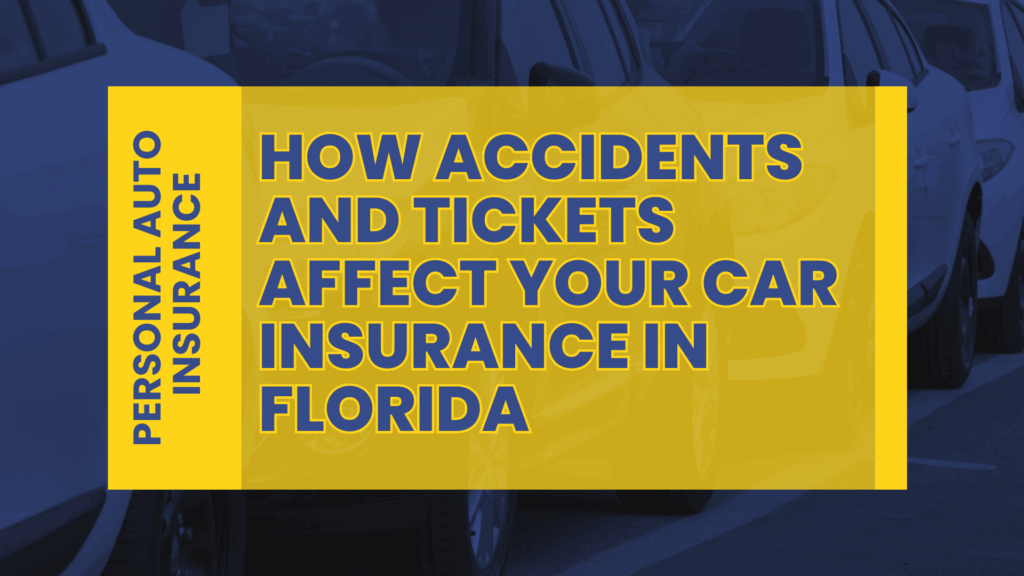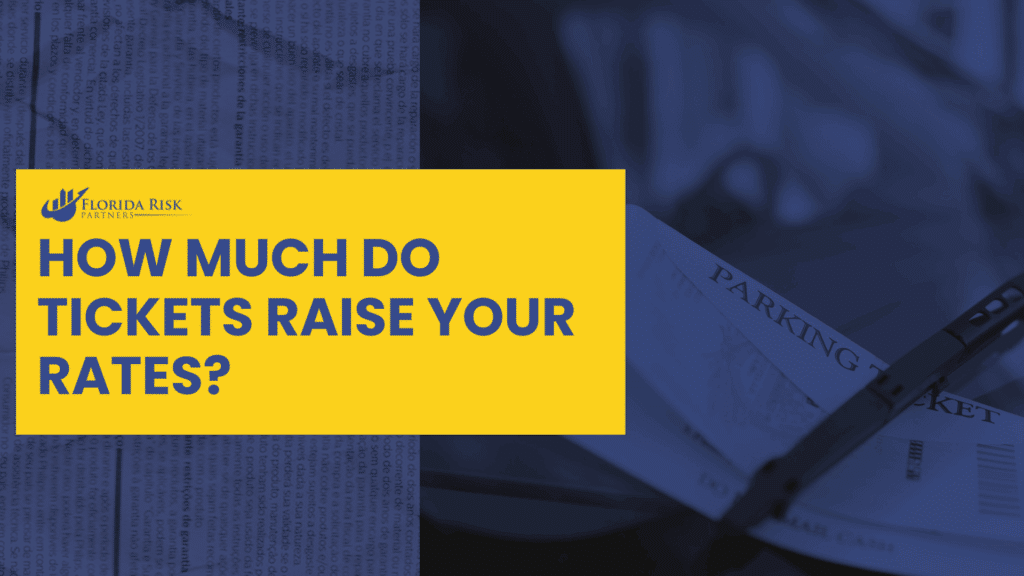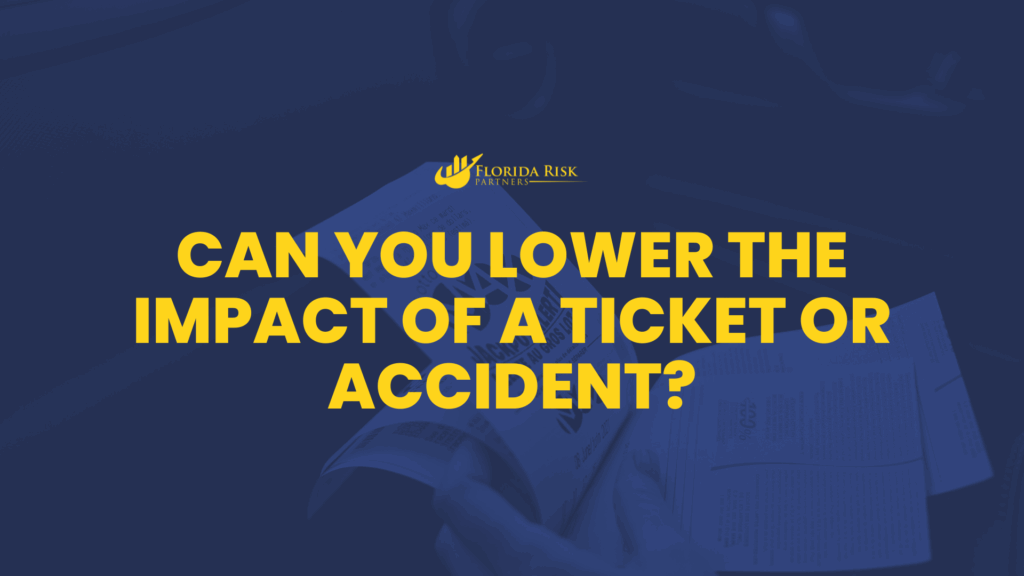-
Main Office: 1434 E. Bloomingdale Ave Valrico, FL 33596-6110
-
Phone: (888) 601-6660
-
Email: info@floridariskpartners.com

The Real Cost of a Mistake Behind the Wheel (and How to Minimize the Damage)
A single mistake on the road can cost more than just a citation or repair bill. In Florida—where car insurance rates are already among the highest in the country—an accident or traffic ticket can cause your premium to spike significantly.
Whether it’s a speeding ticket, a fender bender, or a more serious offense, insurers use your driving record to predict risk—and adjust your rates accordingly. In this post, we’ll explain exactly how accidents and violations impact your car insurance in Florida, how long they stay on your record, and what you can do to reduce their effect over time.
Why Your Driving Record Matters
Your driving history is one of the most important factors insurance companies use to determine your premium. Florida insurers view each ticket or at-fault accident as a sign of higher risk—and higher risk means higher prices.
The severity of the violation, the number of incidents, and the timing all influence how much your rate will go up. Even if you’ve never filed a claim, a single ticket can be enough to trigger a noticeable increase.
Want to see what else affects your rate? Check out our breakdown of the 7 key factors influencing car insurance in Florida.
How Much Do Tickets Raise Your Rates?
The impact of a ticket on your premium depends on the type of violation. Here’s what Florida drivers can expect on average:
- Speeding Ticket (10–15 mph over): Rates may increase by 10%–16%
- Failure to Stop or Yield: 15%–20% increase
- Reckless Driving or DUI: Premiums can double or more
- Driving Without Insurance: Often results in rate increases and license suspension

These increases typically stay on your record for 3 years, although some serious violations (like a DUI) may affect your rate for longer.
In addition to higher premiums, some companies may remove your safe driver discount, which can amplify the financial impact.
What Happens After an At-Fault Accident?
If you’re found at fault in an accident, you can expect your rates to increase—often significantly. The average rate hike after a single at-fault accident in Florida is 20%–40%, depending on the severity of the damage and any injuries involved.
Here’s how insurers evaluate accidents:
- Cost of the claim: Higher payouts = bigger premium increases
- Injuries involved: Medical claims drive up the cost (and your risk score)
- Prior history: If this is your second or third incident, rate increases can be steeper
- Accident forgiveness: Some companies offer this benefit for long-time customers, but it must be earned over time
Florida’s no-fault system requires your Personal Injury Protection (PIP) to cover your medical expenses, but being at fault in a property damage claim can still affect your record and your rates.
Need help understanding Florida’s no-fault rules? Read our Florida Auto Insurance 101 guide.
Can You Lower the Impact of a Ticket or Accident?
Yes—and it starts with taking action early. Here are a few ways Florida drivers can reduce the long-term effects of a ticket or accident:
1. Take a Defensive Driving Course
If you receive a minor traffic citation, Florida law allows you to complete a state-approved driver improvement course to avoid points on your license. Some insurers may also recognize this as a qualifying step for a discount.
2. Don’t File Small Claims
If the damage to your vehicle is minor and you can afford the repair, it may make sense to pay out of pocket rather than file a claim. Once you file, it becomes part of your claims history—even if you aren’t surcharged immediately.
3. Ask About Accident Forgiveness
Some insurance companies offer accident forgiveness as a policy add-on or loyalty benefit. This prevents your first at-fault accident from increasing your rate. If you don’t already have this coverage, ask about adding it before something happens.

4. Shop Around at Renewal
After a ticket or claim, your current insurer may increase your premium, but not all companies treat incidents the same way. Shopping your policy at renewal could uncover a better rate from a more forgiving carrier.
How Long Do Tickets and Accidents Stay on Your Record?
In Florida, most minor violations and at-fault accidents stay on your driving record for 3 years. However, insurance companies may use them as a rating factor for up to 5 years, depending on the carrier.
More serious offenses—like DUI, license suspension, or driving without insurance—can impact your premiums for up to 10 years or more, and may require SR-22 or FR-44 filings to reinstate your driving privileges.
The good news? If you keep a clean record going forward, many of these increases will gradually drop off over time.
Prevention Is the Best Way to Save
The easiest way to keep your car insurance rate low is to avoid tickets and accidents altogether. That means:
- Obeying speed limits
- Staying focused and distraction-free while driving
- Yielding and signaling properly
- Practicing patience in heavy traffic
- Driving defensively, especially during bad weather
Safe driving isn’t just about avoiding penalties—it’s about protecting yourself, your passengers, and your wallet.
Coming Next Week: Are You Protected from Uninsured Drivers?
Florida has one of the highest rates of uninsured drivers in the country. Next week, we’ll explore why Uninsured/Underinsured Motorist (UM/UIM) coverage is one of the most important protections you can add to your policy, and how it works when you need it most.
Call Us Or
Schedule an Appointment
Select an agent below to view our online calendars and select a day and time that works best for you or call us directly at 888-601-6660. When you use our online calendars, you will receive an email with more information.



